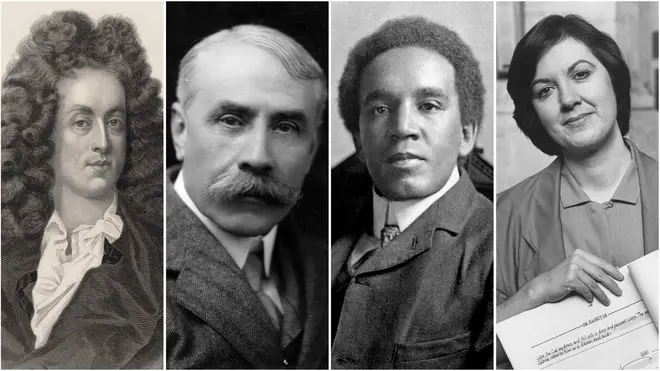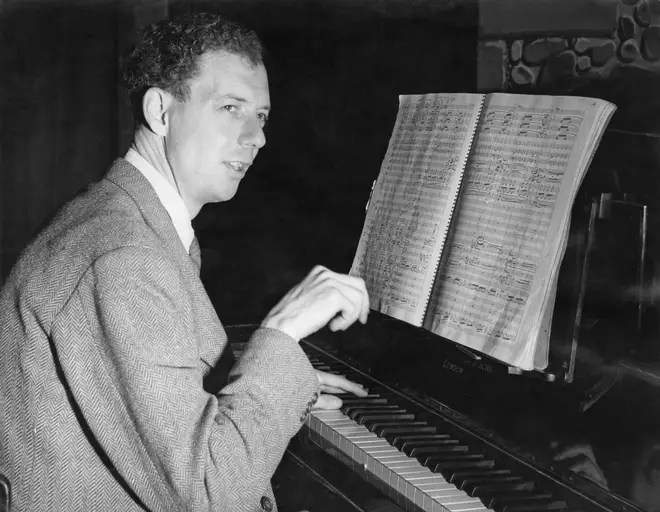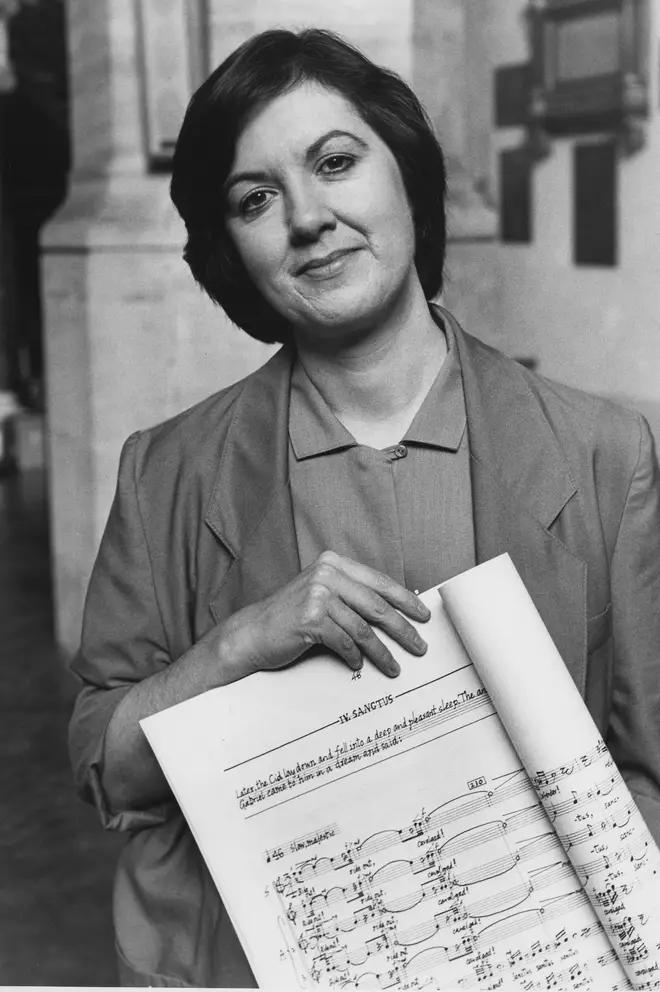It's all about the classical music composers and their works from the last 400 years and much more about music. Hier erfahren Sie alles über die klassischen Komponisten und ihre Meisterwerke der letzten vierhundert Jahre und vieles mehr über Klassische Musik.
Total Pageviews
Thursday, May 11, 2023
MY SWEET LORD "LIVE" (UHD) SENSATIONAL!! ONE OF THE BEST VERSIONS EVER!!!
Lang Lang & Nicole Scherzinger perform at The King's Coronation Concert ...
Monday, May 8, 2023
Sunday, May 7, 2023
Friday, May 5, 2023
Tears (Concerto)
Ways of Listening
By Frances Wilson, Interlude
 “Art is not what you see, but what you make others see.”
“Art is not what you see, but what you make others see.”
This quote from the French artist Edgar Degas could be paraphrased for music – Music is not what you hear, but what you make others hear.
In other words, the role of the performer – like the artist – is to create images, narratives and meaning for the audience through the music they perform. Their own interpretation or concept of the music may not necessarily be easily audible to the listener: we will each perceive and interpret the music in our own way, and what sounds like pleasing music to one person may sound like noise to another! But if a performance evokes a mood or scene, provokes emotions or creates a meaningful experience for the listener, then it can be considered successful in its ability to communicate – in effect, “to make others hear”.

© Tim Robberts/Stone/Getty Images
I’ve selected ‘Dawn’ from Benjamin Britten’s Sea Interludes from Peter Grimes (in an arrangement for organ by Anna Lapwood) to illustrate this point. The composer gives us some help in the title of the piece, but it is down to the performer (Anna Lapwood) to illustrate in sound the “story” of the music to us. I think she does this very successfully, in the restrained opening section, suggesting the gradual increase of light as dawn breaks.
Equally, the finale of Prokofiev’s Piano Sonata No.7 is said portray German tanks invading Stalingrad. Certainly, the music, a savage toccata, has an unrelenting energy, but the intended imagery may not be obvious to every listener – and that’s fine because ultimately, the listening experience should be whatever you get from it! What makes a “good” performance is also in the ear of the beholder, to a greater or lesser extent. An ill-prepared performance, riven with errors and mishaps, will surely be obvious to even the most ingenue listener, but “good” or “great” performance is harder to define because our listening is so subjective and individual, and is inherently biased due to our personal tastes, insight and experience.
The best performers have a clear mental and aural picture of the music, the result of meticulous work not just during physical practicing but in time spent studying the score away from the instrument. In addition, a greater understanding of the music comes from wider knowledge of the composer’s oeuvre, the music of his or her contemporaries, the social and historical context in which the music was written, and comparative listening. Thus the performer can build a detailed, personal vision of the music which they hope will be communicated to their audience. We cannot read the performer’s mind (nor indeed the composer’s!), so it is down to the performer to “tell the story” of the music as best they can, to bring it alive for us through their performance.
One of the most enjoyable aspects of concert-going – and one which I have missed over the long months of the pandemic when opportunities to hear live music have been sparse – is attending a concert with a friend or group of friends and discussing what we have heard during the interval or after the concert. The range of views can sometimes be startling, from “I loved it!” to “I really couldn’t stand it!”, which reveal just how personal our listening experience is.
Music is about communication and expression. It has a special ability to connect, inspire and move us beyond the realms of everyday life.
“The feelings that we get from listening to music are something we produce, it’s not there in the notes. It comes from emotional insight in each of us, the music is just the trigger”. – Dr David Cope
Thursday, May 4, 2023
The secrets of the world’s most famous symphony - Hanako Sawada
Best of Philippine folk dance to be shown at 'Indak Pilipinas'
The bi-annual dance event put the spotlight on the best folkloric groups and their best dance pieces
Get ready to groove with "Indak Pilipinas: Mga Tradisyon at Interpretasyon," the biggest folkloric dance showcase that gathers the best Filipino folk dance groups. The show will happen on May 19, Friday and 20, Saturday, 2023, 7p.m., with 2 p.m. matinee on Saturday, at Metropolitan Theater Manila.

The bi-annual dance event put the spotlight on the best folkloric groups and their best dance pieces choreographed and staged by Philippine National Artists for Dance and other respected personalities in the dance community to celebrate the spirit of the Filipino culture through dance.
Bringing to life the works of pioneering dance choreographers and staging unpublished dance materials and narratives are established professional dance groups such as Bayanihan, The National Folk Dance Company, the Ramon Obusan Folkloric Group, the Philippine Barangay Folk Dance Troupe, the Kaloob, Music and Dance Ministry, and the SINDAW Philippines Performing Arts Guild.
Some of the best regional dance groups join the festival, including Kalilayan Folkloric Group, Sining Palawan Dance Troupe, and Irong-Irong Dance Company.
Featured school/University-based dance groups are: Bulacan State University Lahing Kayumanggi Dance Troupe, Centro Escolar University Folk Dance Troupe, Lyceum of the Philippines University Lahing Batangan Dance Troupe, Philippine High School for the Arts Sanghiyas Pangkat Mananayaw, Philippine Normal University Kislap Sining Dance Troupe, Rizal Technological University Kultura Rizalia Dance Troupe, Technological University of the Philippines Kalinangan Dance Troupe, University of the East Silangan Dance Troupe, University of Santo Tomas Salinggawi Dance Troupe.
In line with the celebration of the National Heritage Month, the fourth edition of Indak Pilipinas perpetuates the promotion and preservation of the country’s diverse dance traditions and heritage, while continuing to define and sustain the national identity and help in the national development through performing arts and dance.
Led by Overall Director Generoso Caringal, with Artistic Consultant Dr. Larry Gabao, Indak Pilipinas is in partnership with the National Commission for Culture and the Arts and the Philippine Folk Dance Society or Samahang Tagapagtaguyod ng Katutubong Sayaw ng Pilipinas.
Ticket prices are: P500 for Orchestra Center, P400 for Orchestra Sides, and P300 for Balcony, with discounts for students, senior citizens, PWD and government employees. Fifty percent group discount for a minimum of 100 tickets.
For tickets and other inquiries, call the CCP Box Office: 8832-3704/8832-1125 local 1409, or check out Ticketworld. Visit the CCP website for more information.
Philippine Philharmonic Orchestra recreates first concert for 50th anniversary gala
Established in 1973, the country’s leading orchestra looks back at its humble beginnings.
After its successful metamorphosis on its recently concluded 38th concert season, the Philippine Philharmonic Orchestra (PPO) turns gold.
Established in 1973, the country’s leading orchestra looks back at its humble beginnings through its PPO 50th Anniversary Gala, slated on May 12, 8 m., at the Metropolitan Theater - the temporary home of the PPO while the CCP Main Building is undergoing rehabilitation.
For this milestone, the CCP resident orchestra recreates in part its very first concert, which happened on May 15, 1973. That debut concert of the orchestra, under the baton of Maestro Luis C. Valencia, its first music director, with Julian Quirit as concertmaster.
In the 1973 concert, the PPO performed Alfredo S. Buenaventura’s Bathaluman and National Artist Lucrecia Kasilag’s Divertissement for Piano and Orchestra. The late National Artist was the president and artistic director of the center back then.
Made possible through the auspices of the former First Lady Imelda R. Marcos, the concert also featured Manuel de Falla’s Noches en los Jardines de España and G. Gershwin’s Rhapsody in Blue, with guest performer pianist Benjamin Tupas.
Initially intended to accompany performing artists at the CCP Theater when the orchestra was founded in 1973, the PPO had been reorganized in 1979, with Prof. Oscar C. Yatco at the helm. Three years later, the Philippine Philharmonic Orchestra was born with a new vision—to be ranked among the best in the world. From then on, the PPO has grown to become the country’s leading orchestra.

Under the baton of Maestro Rodel Colmenar, the PPO will once again relive the first concert, performing Buenventura and Kasilag masterpieces, with young pianist Aidan Ezra Baracol as guest performer. Known as the founder and music director of the Manila Philharmonic Orchestra (MPO), Rodel Colmenar has further proven his great skills and passion for music on international platforms and has collaborated with several outstanding local and foreign classical artists. As a conductor, he is significantly involved in the Kurt Masur Conducting Workshop in Detmold, Germany, and in the masterclasses of French conductor Jean Sebastian Bereau and Italian conductor Pierro Gamba.
Young virtuoso Baracol is currently a Grade 12 scholar at the Philippine High School for the Arts. He has won 16 local and international piano competitions over the last three years, notably the Junior Piano category of the National Music Competitions for Young Artists (NAMCYA). He is currently a scholar of the CCP.
Critically-acclaimed Filipino tenor Arthur Espiritu will perform Salut! Demeure e Chaste et Pure! from Faust (Charles Gounod), Che gelida manina from La Boheme (Giacomo Puccini), and Kundiman ng Langit (Augusto Espino).
Renowned for his impressive vocals and great presence on stage, Espiritu has performed in various operas, concerts, and recitals across the United States and other countries, showcasing his versatility and range as a performer. He has performed in the CCP opera production of Lucia di Lammermoor in 2020.
The anniversary concert will culminate with a must-watch performance of renowned pianist Dr. Raul Sunico, playing G. Gershwin’s Rhapsody in Blue under the baton of PPO resident conductor Herminigildo Ranera. A former CCP president, Sunico has brought home several awards in piano competitions held abroad including a silver medal in the 1979 Viotti International Piano Competition in Vercelli, Italy. He has also given solo recitals in Canada, Mexico, France, the United States, and Australia, among other countries. The Outstanding Young Men of the Philippines Awardee for Music in 1986, he has recorded around 50 compact discs, including his piano transcriptions of Filipino folk songs and kundimans, concertos by Grieg, Saint-Saens, Ravel, and Lucino Sacramento; solo classical pieces; popular American songs set to piano; chamber and duo piano music, and original compositions.
A multi-awarded performer, Ranera was a three-time prize winner of the NAMCYA in 1982 and 1983 as a performer in Trombone, Baritone, and Tuba (Chamber Music) categories. He was a prize- winner of the 1983 League of Filipino Composers Competition for Young Composers and collaborated with his mentor, Fr. Manuel P. Maramba, O.S.B. for various CCP productions. Ranera is the founder of the Philippine Band Association (PHILBANDA), a board member of the Asia-Pacific Band Directors Association, and the adviser of the Band Conductors League of the Philippines.
Coinciding with the gala concert, the CCP and PPO partnered with Widescope Entertainment to launch “Serenata,” the seven-track album consisting of well-loved Philippine folk songs and melodies from various regions of the country, on Spotify.
Originally released in 2014, the album includes: Atin Cu Pung Singsing (Kapampangan),Sarung Banggi (Bicolano), Ti Ayat Ti Maysa Nga Ubing (Ilocano), Sampaguita (Original Spanish “La Flor de Manila”), Malinac lay labi (Pangasinense), No Te Vayas De Zamboanga (Chavacano), and Walay Angay (Ilonggo).
National Artist Ryan Cayabyab gave a fresh interpretation to the seven well-loved folk songs, without compromising their traditional musical characteristics and making them multi-layered compositions. The decision to release Serenata in Spotify is in line with the CCP’s continuous efforts to awaken the consciousness of Filipinos to Philippine cultural heritage, and encourage the development and enhance public interest and appreciation of arts in various fields.
Tickets to the PPO 50th Anniversary Concert are available at the CCP Box Office, located at Tanghalang Ignacio Gimenez, Vicente Sotto Street, from Tuesday to Friday, from 9 a.m. to 6 p.m. You can also get tickets at the TicketWorld via www.ticketworld.com.ph. Ticket prices are P3,000 for Loge Premium and Orchestra Center Premium, P1,500 for Orchestra Left and Right, and P800 forBalcony Center, Right, and Left.
For other ticket details and inquiries, contact the CCP Marketing Department at salesandpromotions@culturalcenter.gov.ph. Visit the CCP website for more information. Follow the official CCP social media accounts on Facebook, Twitter, Instagram, and TikTok for the latest updates.
Wednesday, May 3, 2023
Eric Clapton - Layla (Live)
10 British composers who shaped the nation’s classical music legacy
By Maddy Shaw Roberts & Rosie Pentreath
From Tallis to Weir – here are some of Britain’s most compelling musical voices from the past few hundred years.
As a new monarch is soon to be crowned, on Classic FM we’re handpicking the finest classical music written by British composers.
From the 16th through to 21st century, here are some of the English, Scottish and Welsh composers who have shaped Britain’s incredible musical legacy.
Thomas Tallis (1505-1585)
Unquestionably one of the finest English composers in history, Tallis is known for the sublime choral settings he wrote – including the hymn, ‘Thou wast, O God’, which inspired Vaughan Williams’ (see below) Fantasia on a Theme by Thomas Tallis, and the stunning 40-part masterpiece, Spem in Alium – which translates as ‘I Have Hope in No Other’ and is written for eight choirs of five separate voices.
Tallis was a composer throughout the reigns of Henry VIII, Edward VI, Mary I and Elizabeth I and, in spite of upheavals in the church created by these monarchs, remained a steadfast composer of sacred music, able to adapt his style and set texts in both English and Latin. Six
William Byrd (1543-1623)
Byrd wrote some of the most sublime music known to the human ear. A Renaissance master, his music defined the reign of Queen Elizabeth I, who had a deep love for his music and so turned a blind eye to his devout Roman Catholicism.
From sacred and secular vocal works, to his keyboard and consort music, Byrd’s compositions often reflected the hardship and practising his faith at the time, through anguished harmonies and long, yearning phrases. a hi
Henry Purcell (1659-1695)
Purcell is considered England’s greatest composer of the Baroque era. Inspired by Italian and French Baroque styles, he shaped a uniquely English version and was dubbed the “Orpheus Britannicus” for his skill in combining powerful counterpoint with expressive, flexible and dramatic lyrical settings.
No other English composers managed to approach his stardom, until Elgar came along two centuries later. The heart-rending aria ‘When I am laid in earth’, from his opera Dido and Aeneas, continues to excite musicians and touch audiences today. am
Edward Elgar (1857–1934)
Elgar is perhaps the quintessential English composer, many of his works having entered the classical music canon.
Both his enduring Cello Concerto and Violin Concerto remain staples of their instruments’ core concert repertoire, recorded time and time again by the finest musicians out there. And his famous Enigma Variations, two symphonies, and the Pomp and Circumstance Marches all demonstrate his superlative orchestral and instrumental writing. e
Ralph Vaughan Williams (1872–1958)
English composer Ralph Vaughan Williams was one of the most important figures in classical music in the 20th century. Taking inspiration from sources as diverse as Tudor polyphony and English folksong, Vaughan Williams wrote nine symphonies, six operas, a ballet and hymn tunes as well as scores for the stage and screen.
He helped revive British music, and his works like The Lark Ascending and Fantasia on a Theme by Thomas Tallis remain incredibly popular, often topping the Classic FM Hall of Fame, which is the world’s largest survey of classical music tastes.
Samuel Coleridge-Taylor (1875-1912)
A contemporary of Vaughan Williams and Holst, Samuel Coleridge-Taylor was an English composer and conductor famous for rich orchestral works and brilliant instrumental writing. Among his best-known works are the Violin Concerto in G minor, The Song of Hiawatha and his arrangement of African American spiritual ‘Deep River’, which was exquisitely reimagined by the Kanneh-Mason family trio (watch below).
In 2021, Coleridge-Taylor made his debut in the Classic FM Hall of Fame, marking a renewed interest in this long-neglected composer’s music. Benjamin Britten (1913-1976)
For English composer, conductor and pianist Britten, the human experience and psyche was an endless source of inspiration. His operas especially, including The Turn of the Screw and Peter Grimes, use powerful music to set stories of the isolated individual increasingly at odds with a hostile society.
And his crowning masterpiece, the War Requiem, is a poignant commemoration by a pacifist composer of the devastating loss of life caused by the Second World War. Dedicated to Britten and his partner Peter Pears’ personal friends who died during the war, the work powerfully sets nine war poems by the English poet Wilfred Owen throughout the traditional Latin Mass for the Dead. It was commissioned for, and premiered at, the 1962 opening of the new Coventry Cathedral.
Benjamin Britten. Picture: Getty Judith Weir (1954–)
Scottish composer Judith Weir made history in 2014 when she became the first ever female Master of the Queen’s Music, a role that is music’s equivalent to the Poet Laureate.
Weir is known for her pioneering operas and stage works – including The Vanishing Bridegroom and Blond Eckbert – which often take inspiration from medieval history and traditional Scottish music. She started out as an oboe player, performing with the National Youth Orchestra of Great Britain, and she studied composition with Song of Athene composer, John Tavener, during her schooldays.
Judith Weir, Master of the Queen's Music. Picture: Getty Debbie Wiseman (1963–)
Debbie Wiseman OBE, Classic FM’s Composer in Residence, has enjoyed bountiful success in recent years with her album The Glorious Garden with gardening royalty Alan Titchmarsh, which celebrates the great outdoors, and her 2020 composition, Together, written for those at home or self-isolating during lockdown.
Her music for TV and film is also well loved, her score for the Stephen Fry-starring biopic of Oscar Wilde now as special to viewers as the film that inspired it. In 2021, the acclaimed composer and conductor became the most popular living British composer in the Classic FM Hall of Fame for the first time.

Debbie Wiseman: A Lustre to this Day
Paul Mealor (1975–)
The year 2011 was a golden time for Welsh composer Paul Mealor, whose motet Ubi Caritas et Amor was performed at the wedding of the Duke and Duchess of Cambridge. Just a few months later, he was commissioned to write the music for ‘Wherever You Are’, whose text was compiled from letters written to British Army soldiers in the Afghanistan War by their partners, for the TV series The Choir: Military Wives.
The song went to Christmas No. 1, and the following year he was voted the “nation’s favourite living composer” in the Classic FM Hall of Fame, charting at No. 5. On top of his unparalleled chart success, Mealor is a prolific classical composer and has written an opera, three symphonies, concertos and chamber music.





